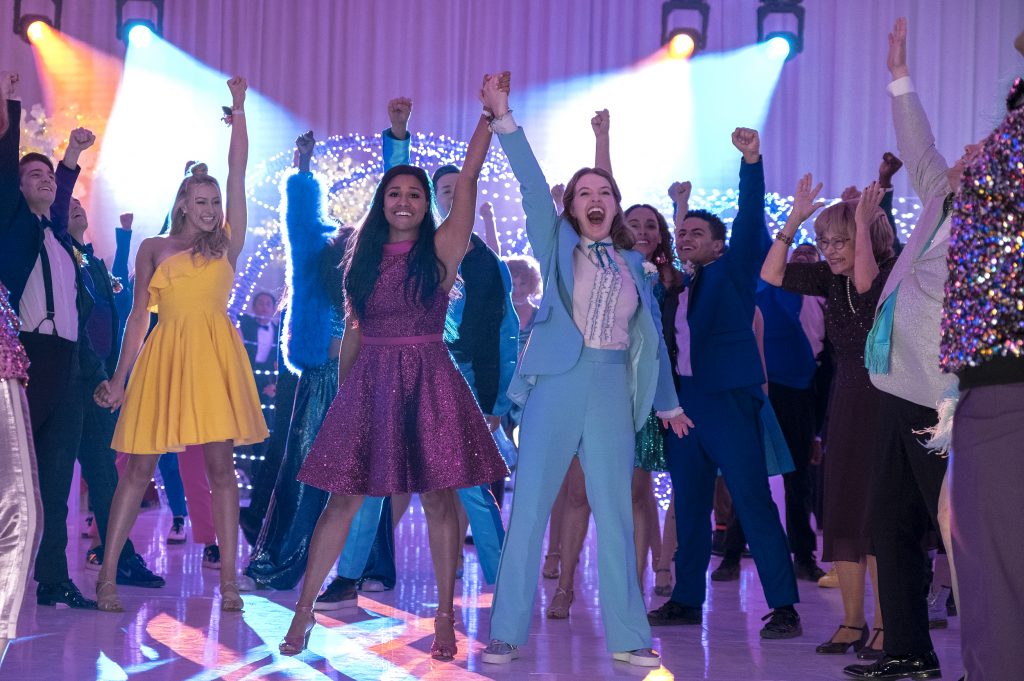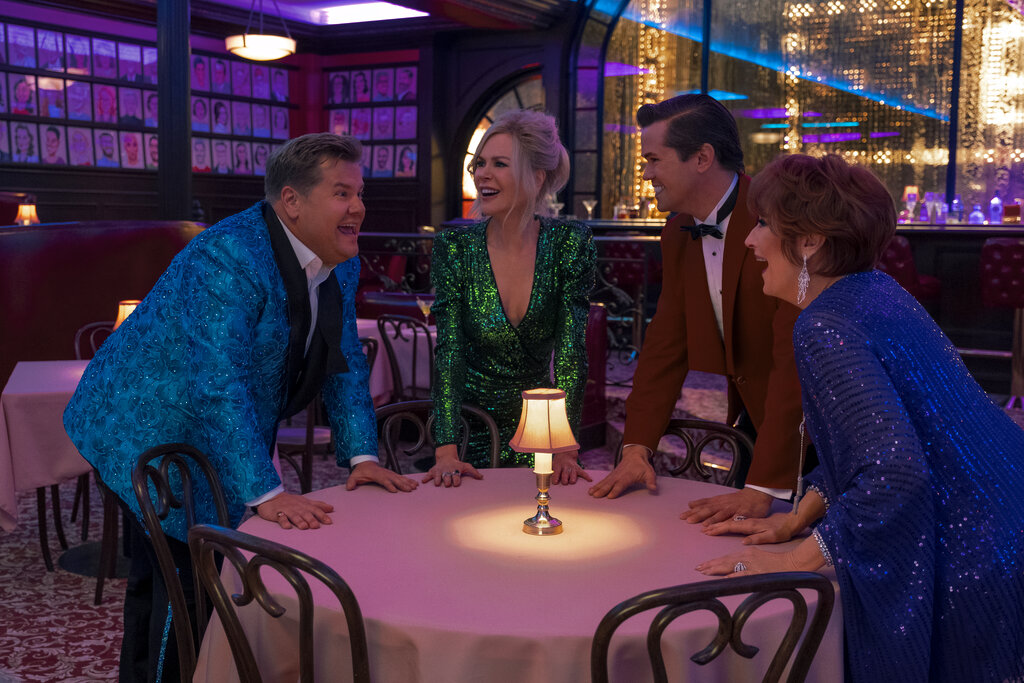Rebecca’s Take
If you’re missing the bright lights of the theater, then be sure to make a date with “The Prom.” Netflix’s dazzling adaptation of the Broadway musical brings the candy-colored extravaganza into our living rooms.
With its rousing songs, powerhouse ensemble and inclusive messages, “The Prom” sparkles. Ryan Murphy’s heart-warming musical offers an enjoyable escape from the ongoing coronavirus pandemic. The uplifting story will have you laughing one minute and crying the next.
“The Prom” follows four washed-up theater performers – Dee Dee Allen (Meryl Streep), Barry Glickman (James Corden), Angie Dickinson (Nicole Kidman) and Trent Oliver (Andrew Rannells) – who are looking to support a cause to raise their public profiles. They find one in Emma Nolan (Jo Ellen Pellman), an Indiana teen who encounters resistance when she wants to bring her girlfriend to the high school prom.
The four actors descend on the small Midwest town to help Emma. But in getting to know the sensitive teen, they also get to know themselves. In a moving journey of self-discovery, Emma learns from the performers how to accept herself in a community that struggles to do so. Meanwhile, the actors learn from Emma they can make more of an impact than they ever dreamed.
Turning up the glitz, “The Prom” stuns with its vibrant showstoppers and memorable songs. Bringing his cred from “Glee,” Murphy excels at directing the film’s musical numbers. All aspects of the film’s set pieces come together wonderfully, from the catchy lyrics, eye-popping visuals and intense choreography. “Changing Lives,” the energy-filled opener, establishes the color palette for the film, bursting with shades of pinks, purples and blues. The lighting effects transport the feel of the Broadway stage into the film’s frames.
With its stacked cast, “The Prom” gives each main character their time to shine. The film gathers an impressive level of talent, led by Streep. The legendary actress is at the top of her game, relishing playing a theater diva. Her voice is as strong as ever. Streep pulls off being both flashy and vulnerable, knowing when to ham it up and when to tone it down. When she disrupts a PTA meeting by belting out the fabulous “It’s Not About Me,” you can’t take your eyes off her. But Streep also lets down Dee Dee’s walls. When the selfish songstress slows things down to sing “The Lady’s Improving,” you can feel Dee Dee’s desire to change.
The funny and charming Corden does a lot of heavy lifting as Barry, delivering an emotionally charged performance. Barry is still dealing with being estranged from his parents after coming out as gay as a teen. His tender friendship with Dee Dee and his mentoring relationship with Emma are vital to the film. Corden shares a lovely chemistry with Streep, which comes through during a heartfelt scene in a hotel room that left me misty-eyed. His bond with Pellman is sweet and believable. Barry’s encouragement of Emma forms the basis for the inspiring “Tonight Belongs to You.” Later, he finds acceptance in the joyful “Barry is Going to Prom.”
As the story’s central teen, Pellman gives a breakout performance as Emma. Making her feature film debut, Pellman has the voice of an angel paired with the expressive eyes of a veteran. The youthful performer had me in the palm of her hand during the ballad “Just Breathe,” where Emma explains how she copes with her disapproving classmates. Pellman plays beautifully opposite Ariana DeBose, who portrays Emma’s secret girlfriend Alyssa Greene. As the all-around girl next door, Alyssa struggles to live up to the high standards set for her. The duo’s voices mesh beautifully in the hopeful duet “Dance with You” and its answer, “It’s Time to Dance.” You may recognize the graceful DeBose from this year’s “Hamilton” film, and you’ll be sure to see her again in next year’s highly anticipated “West Side Story.”
Coming off his role in “Jingle Jangle: A Christmas Journey,” comedian Keegan-Michael Key is carving out a place for himself in musicals. Key shines in an understated role as the high school’s principal, Tom Hawkins. He sings “We Look to You,” a sweet ballad that praises the theater as a means of escape from daily life. This was my favorite song in the film because it reminded me of the solace I find in movie theaters. However, due to the pandemic, both Broadway and cinemas remain dim. “The Prom” reminds us we can still experience the pleasures of stage and film at home.
With such a quality ensemble, sometimes it feels like “The Prom” doesn’t give enough screen time to certain performers. The film juggles so many storylines that some don’t get fleshed out enough.
I could have used more Kidman and Rannells, who do the most with what they have. The effervescent Kidman thrives during the spirited “Zazz,” showing off her high-kicking ability. Rannells gets one of the best set pieces of the film with the dynamic group number “Love Thy Neighbor,” in which Trent points out the hypocrisy in the high school students’ religious beliefs. Still, I wished we had seen more of both characters.
“The Prom” also misuses Kerry Washington. As Mrs. Greene, Alyssa’s mom and PTA president, the character is largely one-note. That’s a disservice to the fantastic actress’s talent.
Encased in glamor and glitter, “The Prom” escorts viewers to a delightful showcase of acceptance and inclusion. Backed by an incredible ensemble and show-stopping tunes, the musical spotlights the struggle for LGBTQ acceptance and celebrates the love and understanding that can emerge from it. As we find ourselves at home again during what could be the dark days of the pandemic, “The Prom” is a welcome diversion that celebrates diversity and lets in the light.
4 out of 5 stars

Ariana DeBose, third from left, and Jo Ellen Pellman, fourth from left, star in “The Prom.”
Joe’s Take
I’ve become a bigger fan of musicals over the past few years, but I’m far from an expert in the genre. Fortunately, I know it enough to confidently say “The Prom” missed the mark … whatever that mark was.
The film throws star power at the audience with great talent, such as Meryl Streep, James Corden, Nicole Kidman, Kerry Washington and Keegan-Michael Key. It also produces a plethora of musical numbers that run together over a gargantuan 2-hour, 12-minute run time. In that window, “The Prom” failed to establish a true main character and a cohesive story.
I suppose it’s difficult to center a story on Jo Ellen Pellman’s character (Emma Nolan) when Streep (Dee Dee Allen) is in your movie, so the Netflix film figured why not do both? And throw in a Corden (Barry Glickman) subplot? And a random Kidman (Angie Dickinson) number because we paid her and she’s here and she’s great? Not a great plan.
The movie starts twice, first with Pellman and then with Streep and Corden before Kidman walks in out of nowhere. I needed these characters’ lives to intersect so it could become one movie as soon as possible. It was at that point I understood the 2-hour, 12-minute run time. I was going to be in for a long one.
“The Prom” can easily shed time getting rid of a character and that’s Kidman’s Dickinson. I want to be clear that I love Nicole Kidman. I think she’s an awesome actress. Why was she in this movie? She had her moment that was set up by Nolan needing a friend, even though she already had that in Glickman. She uses it for her musical number “Zazz,” which adds nothing to the film. I don’t remember her contributing much else. Eliminate Kidman and we can all get some time back in our lives.
It could probably lose a subplot or two as well. The audience is already given a story about a teen (Nolan) whose parents kicked her out of the house when she told them she is gay. For some reason the film gives Glickman that subplot, which is explored. Why couldn’t the story focus more on a main character and make it part of her story? There’s no focus. Just a bunch of subplots that don’t allow the audience to become attached to anybody.
Glickman changes emotions at the drop of a hat, much like most of the characters do in this film when the screenplay demands it. When the movie starts he doesn’t care about anybody. That’s fine, but there has to be an evolution. Instead, he immediately starts caring for Nolan. His shift in character would have been more believable if it wasn’t so drastic.
Speaking of drastic, my least favorite part of the film (and best moment of unintentional comedy) came when Andrew Rannells’ character (Trent Oliver) convinces a mall of people that hating gay people is wrong during a five-minute musical number. No really, people in this Indiana town who apparently have spent their whole lives thinking that being gay is wrong and a choice do a 180 and realize Oliver is right. Now what he’s saying is sound logic, but the writers of this obviously don’t understand hate is deep-rooted and can’t change on a whim. What also amazes me is the film built in, I don’t know if I’ve mentioned this, 2 hours and 12 minutes and devotes five to changing some of the supporting characters’ minds about inclusion and openness. I saw it happening and I couldn’t help but laugh at the absurdity. I found Rannells delightful and his rendition of “Love Thy Neighbor” catchy, but that scene construction is inexcusable.
This film takes place in a small conservative town in Indiana that is often referred to as a “hick town.” And who did they get to play the antagonist of the movie in this “hick town?” Kerry Washington (Mrs. Greene). I am not capable of suspending that much disbelief to ever buy into that absurd premise.
I never bought Streep’s character either. The movie will tell you that she had an arc, but it didn’t do a good enough job selling it. Like Glickman, she (Allen) starts off as selfish. She begins helping Nolan, but always reluctantly. She never seems to actually want to help out. She’s more so forced into it because she’s lonely and wants to date Key’s character (Principal Tom Hawkins).
Hawkins is my favorite, because he spends a lot of the movie saying the things I would say to people on the set of the film. Some phrases include, “What are you doing here,” “Let us handle this” and “You’re a bad person.” He also takes on my favorite part of the film when he sings “We Look at You” as he explains why he needs the theater and performers. They are an escape and that really hit home with me.
The performances are solid, and director Ryan Murphy creates some excellent set pieces with vibrant colors, but ultimately “The Prom” is a lot of flash with little substance. It’s funny at times, it’s emotional at times, but it fails to have one singular, powerful story. I understand it was going for an ensemble, but it just didn’t work.
Ariana DeBose plays Alyssa Greene in this film and also has a subplot. Instead of getting into it, I’m going to tell you that she portrays “The Bullet” in “Hamilton.” Look up her character in that and I guarantee it will be more interesting than anything in “The Prom.”
I’m thrilled films are exploring the gay community and centering on gay couples. I love the theme of inclusion. Unfortunately, “The Prom” is a well-intentioned mess.
2 out of 5 stars

Rebecca Kivak and Joe Baress write about movies for Take 2 blog. Together, they review current flicks and offer their insights into the latest movie news. Rebecca is a copy editor and page designer at The Times-Tribune. She started her career with Times-Shamrock Newspapers in 2005 and has won several professional journalism awards for page design and headline writing. She also covers NASCAR races from Pocono Raceway. Contact: rkivak@timesshamrock.com; 570-348-9100 x5126; @TTRebeccaKivak




